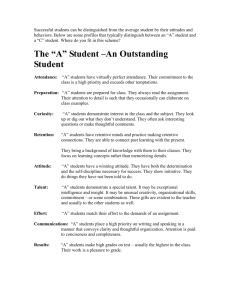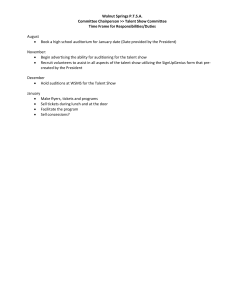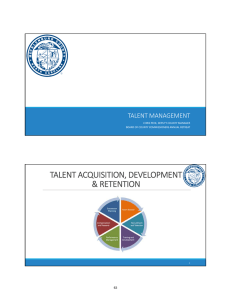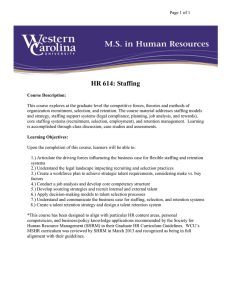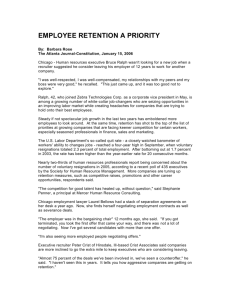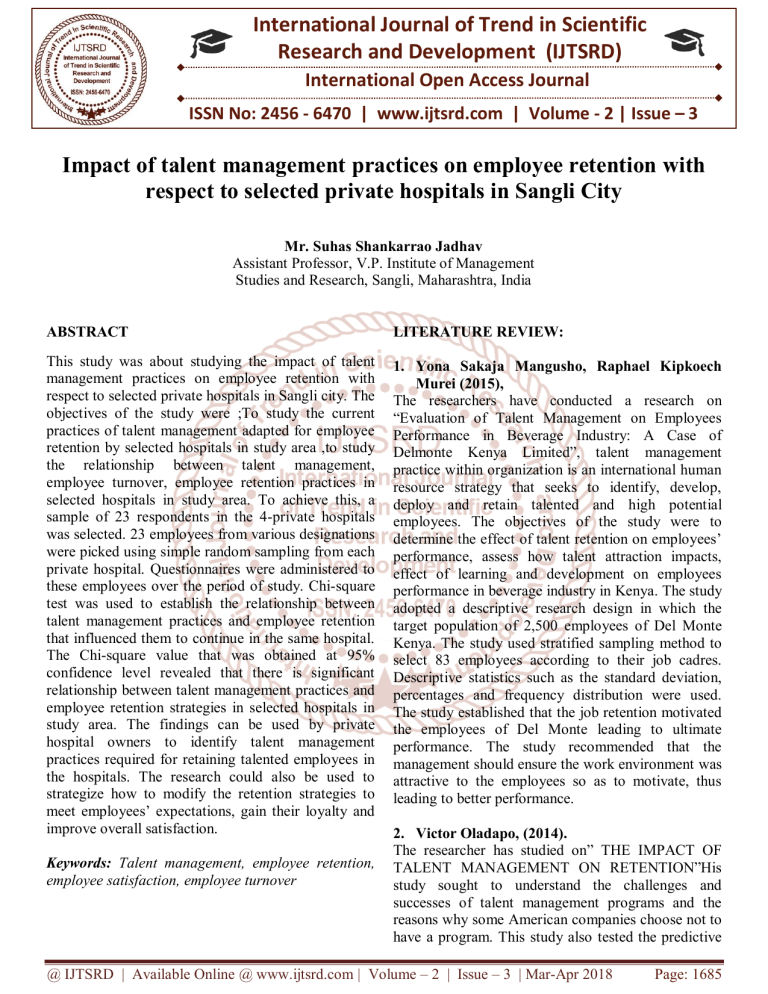
International Journal of Trend in Scientific
Research and Development (IJTSRD)
International Open Access Journal
ISSN No: 2456 - 6470 | www.ijtsrd.com | Volume - 2 | Issue – 3
Impact of talent management practices on employee retention with
respect to selected private hospitals in Sangli City
Mr. Suhas Shankarrao Jadhav
Assistant Professor, V.P. Institute of Management
Studies and Research, Sangli, Maharashtra, India
ABSTRACT
LITERATURE REVIEW:
This study was about studying the impact of talent
management practices on employee retention with
respect to selected private hospitals in Sangli city. The
objectives of the study were ;To study the current
practices of talent management adapted for employee
retention by selected hospitals in study area ,to study
the relationship between talent management,
employee turnover, employee retention practices in
selected hospitals in study area. To achieve this, a
sample of 23 respondents in the 4-private hospitals
was selected. 23 employees from various designations
were picked using simple random sampling from each
private hospital. Questionnaires were administered to
these employees over the period of study. Chi-square
test was used to establish the relationship between
talent management practices and employee retention
that influenced them to continue in the same hospital.
The Chi-square value that was obtained at 95%
confidence level revealed that there is significant
relationship between talent management practices and
employee retention strategies in selected hospitals in
study area. The findings can be used by private
hospital owners to identify talent management
practices required for retaining talented employees in
the hospitals. The research could also be used to
strategize how to modify the retention strategies to
meet employees’ expectations, gain their loyalty and
improve overall satisfaction.
1. Yona Sakaja Mangusho, Raphael Kipkoech
Murei (2015),
The researchers have conducted a research on
“Evaluation of Talent Management on Employees
Performance in Beverage Industry: A Case of
Delmonte Kenya Limited”, talent management
practice within organization is an international human
resource strategy that seeks to identify, develop,
deploy and retain talented and high potential
employees. The objectives of the study were to
determine the effect of talent retention on employees’
performance, assess how talent attraction impacts,
effect of learning and development on employees
performance in beverage industry in Kenya. The study
adopted a descriptive research design in which the
target population of 2,500 employees of Del Monte
Kenya. The study used stratified sampling method to
select 83 employees according to their job cadres.
Descriptive statistics such as the standard deviation,
percentages and frequency distribution were used.
The study established that the job retention motivated
the employees of Del Monte leading to ultimate
performance. The study recommended that the
management should ensure the work environment was
attractive to the employees so as to motivate, thus
leading to better performance.
Keywords: Talent management, employee retention,
employee satisfaction, employee turnover
2. Victor Oladapo, (2014).
The researcher has studied on” THE IMPACT OF
TALENT MANAGEMENT ON RETENTION”His
study sought to understand the challenges and
successes of talent management programs and the
reasons why some American companies choose not to
have a program. This study also tested the predictive
@ IJTSRD | Available Online @ www.ijtsrd.com | Volume – 2 | Issue – 3 | Mar-Apr 2018
Page: 1685
International Journal of Trend in Scientific Research and Development (IJTSRD) ISSN: 2456-6470
power of job security, compensation and opportunity
on retention rates.
The data in this study found that for the organizations
sampled with a talent management program (69% of
those
studied),
participants
overwhelmingly
recognized the strategic value often effective talent
management program despite significant challenges to
implementation. Participants cited opportunity for job
advancement as the most significant factor affecting
retention rate. For the organizations sampled without
a talent management program (the remaining 31% of
those studied), while nearly all HR managers’ support
talent management, the primary reason given for the
lack of a program is the absence of executive
management support. The study further revealed that
job security, compensation, and opportunity for
advancement were not found to have predictive value
for employee retention rates. The current study was
exploratory and descriptive in nature, and therefore
helped to define some of the parameters and patterns
of the perceptions of HR personnel regarding what
matters in employee retention. The current study does
not directly assess all of the potential factors relevant
to employee retention, but uses the preconceived ideas
of the researcher.
3. Ali Chitsaz-Isfahani, HamidReza Boustani
(2014).
The researchers had conducted research on” Effects of
Talent Management on Employees Retention: The
Mediate Effect of Organizational Trust” Talent
management is found to be important for modern
organizations because of the advent of the Modern
economy, new generations entering the human
resource and the need for businesses to become more
strategic and competitive, which implies new ways of
managing resource and human capital. In this research
they had investigated the relationship between Talent
management, employee Retention and organizational
trust. The aim of the article is to examine the effect of
Talent management on employee Retention through
organizational trust among staffs of Isfahan
University in Iran. The research method is a
descriptive survey. The statistical population consists
of staffs of Isfahan University in Iran. The sample
included 280 employees, which were selected
randomly. Data have been collected by a researcherdeveloped questionnaire and sampling has been done
through census and analyzed using SPSS and AMOS
software. The validity of the instrument was achieved
through content validity and the reliability through
Cronbach Alpha. The results of hypothesis testing
indicate that there is a significant relationship between
Talent management, employee Retention and
organizational trust. The study is significant in that it
draws attention to the effects of talent management on
organizational trust and employees Retention in
organization. The limitation of this study was it just
aimed on six dimensions including Career
Management, Mentoring, Coaching, Training, Job
Experience and Succession Planning on employee
Retention through organizational trust among staffs of
Isfahan University in Iran.
While
other
comprehensive dimensions were not covered
4. Maya M., R. Thamilselvan (2013),
The researcher had performed a study on “Impact of
Talent Management on Employee Performance and
Organizational Efficiency In ITSP’s with reference to
Chennai City”, in his study addresses how talent
management practices help in improving the
performance of employees and its role in
organizational efficiency. The survey was carried out
on ITSP’s in Chennai city. NASSCOM ranked top 5
companies were chosen and the samples were selected
from the software development group, where job
hopping behavior is very high. The data were
analyzed using chi square test and Friedman analysis.
The result showed a significant association on the role
played by talent management in employee’s
performance and organizational efficiency. This study
was restricted to only top 5 Information Technology
Service Provider companies and hence the researcher
does not have the knowledge about rest of the low
performing companies.
5. Usha Tiwari, Devanshi Shrivastava, (2013)
The researchers had conducted a study on “Strategies
And Practices Of Talent Management And Their
Impact On Employee Retention And Effectiveness.”
They had studied the strategies and practices of talent
management and their impact on employee retention
and effectiveness of its execution at AREVA T&D
India Ltd. The prime focus of this study has to
analysis the talent management initiative taken by the
HR professional and find out the effectiveness of such
initiatives as well as the satisfaction level of the
employees. Simple percentage analysis, Chi squire
test and analysis of variance (ANOVA) were used for
evaluation. The study revealed that age of employees
is independent from satisfaction but experience of
employees does affect the satisfaction with the
practices of talent management. Finding of ANOVA
@ IJTSRD | Available Online @ www.ijtsrd.com | Volume – 2 | Issue – 3 | Mar-Apr 2018
Page: 1686
International Journal of Trend in Scientific Research and Development (IJTSRD) ISSN: 2456-6470
revealed that each of the parameter has a different
impact on effectiveness of talent management
practices but a distinctive impact on employee's
satisfaction.
6. Kwenin D. O., Muathe S., Nzulwa R.,(2013) The
researchers had worked on “The influence of
employee rewards, human resource policies and job
satisfaction on the retention of employees in
Vodafone Ghana ltd.” The purpose of their study was
to investigate the influence of employee rewards, job
satisfaction and human resource policies on employee
retention in Vodafone Ghana ltd. The study surveyed
120 employees from Vodafone Ghana ltd. Data
collection was done by means of a semi structured
questionnaire through personal contacts. Data was
analyzed with descriptive statistic and Pearson Chisquare. The result showed that when organization’s
reward systems are adequate, it does not only lead to
equity, but increase retention. It was also found that
job satisfaction and favorable human resource policies
have positive link with retention. A limitation of the
study was that the questionnaire was voluntarily
completed by the respondents; the researcher there for
had no information about non respondents.
7. Akila R. (2012) The researcher had carried a
research on “A study on employee retention among
executives at BGR energy systems ltd. Chennai”. The
employee retention programme at BGR was not found
satisfactory. The analysis of data revealed that
employees have give highest weighting to
comfortableness in working hours and not satisfied
with the annual increments provided. Gender has
significant relationship with work life balance.
Correlation between job satisfaction and working
condition leads to employee retention. The
departments also have an influence on it. The factors
that had a greater influence on employee retention
were career opportunities, work life balance and
recognition at BGR energy.
8. Richard C. Hoffmana* and Frank M. Shippera,
(2011) The researchers hadengaged a study on “The
impact of managerial skills on employee outcomes: a
cross cultural study”Leaders with global skills are in
demand by MNCs. Global management skills depend
on the applicability of management practices across
cultures. Using data from managers in 50 countries,
this study examines the interaction effect of cultural
values and managerial skills on two outcomes,
employees' attitudes and workgroup effectiveness.
The results indicate that cultural values tend to have a
greater effect when a manager is less skilled than
when the manager is highly skilled. When the
manager is highly skilled, the interaction effects of
culture tend to disappear. The practical and research
implications of these findings are discussed.
9. Anappindi S. and Manohar M.S. (2011) The
researchers conducted a study on “ I am here to stay !
The stock broking way (an Indian perspective) : part
1.”
This study focused on how better one can integrate
the employee aspirations with the goals and missions
of an organization. The factors like changing office
dynamics, grown intellectuality and aspiration etc.
were studied for employee retention.
10. Ghosh Koustab and Sahney S. (2011) The
researchers had studied the “Impact of organizational
socio-technical system on managerial retention – A
general liner modeling approach.”This study
concluded that in the industrial organizations,
designing the managerial jobs by balancing the both
organizational social and technical subsystem
elements does impact on managerial retentions.
11. Groeneveld S. (2010) The researcher conducted
a research on a research on “Diversity and employee
turnover in Dutch Public sector” to explore the
differences in turnover and turnover intensions by
gender and ethnicity. By analyzing the two data sets :determinants of turnover and turnover intension of
both native Dutch and ethnic minority men and
women , the results showed that the women’s
turnover is mostly commonly associated with the
intrinsic factors (like needs and values etc.), where as
for the men the causes are extrinsic factors (like
organizational leadership, management support etc.)
12. Makawatsakul Nantapron and Kleiner H.
Brain (2010)
The researchers had conducted a
research on “ the effect of downsizing on morale and
attrition”They have studied the factors of morale and
downsizing, how morale is measured. The study
revealed the importance of role of management
towards effective downsizing & positive attrition i.e.
keeping the downsized employee happy during the
downsizing process.
13. Bergiel E. B., Nguyen V.Q. and Clenney B. F.
(2009) The researchers had studied “Human resource
practices, job embeddedness and intention to quit”
@ IJTSRD | Available Online @ www.ijtsrd.com | Volume – 2 | Issue – 3 | Mar-Apr 2018
Page: 1687
International Journal of Trend in Scientific Research and Development (IJTSRD) ISSN: 2456-6470
They used job embeddedness ,a new construct, to
investigate its mediation effect on its relationship
between employees’ intention to leave and four areas
of human resource practices : compensation,
supervisor support, growth opportunity and training.
The results showed that job embeddedness fully
mediated compensation and growth opportunity,
partially mediated supervisor support , and did not
mediated training in relation to employee’s intention
to quit.
14. Beulen Erik (2009) The researcher conducted
study on “ Contribution global service provider’s
Human Resource Information System (HIRS) to staff
retention in immerging markets- Comparing issues
and implications in six developing countries.” The
argument was illustrated by quotes from 16 semistructured expert interviews with Accenture HR
executives and managers in Argentina, Brazil, China,
India, Latvia and Slovakia. It was found that HRISs
contribute positively to staff retention for global IT
service providers in immerging markets. Especially
important in minimizing the turnover is the support
that they can provide for allocation of employees for
international engagements, including scheduling and
training. Culture and local labor market differences do
of course influence the HR functionalities needed.
This study provides insight into the factors that
nesseciates local adaption to a global HRIS.
15. Cordray Kevin (2005) The researcher had
conducted a research on “High retention rates bring
customer benefits at SITEL- Direct- Why Call center
company bucks the trend.” The researcher found that
the company consistently maintains monthly retention
rates that are not only above the industry benchmarks
but also compare well with other sectors in the
customer services industry. The researcher further
found the company’s overall offering of
comprehensive
training,
career
development
opportunities, working hour flexibility, sense of
community and convenient location not only
contribute to its strong position in the market place,
but also to the experience of every customer
interaction.
Statement of the Problem:
The hospitals being the part of service sector are
largely dependent for their success and survival on the
performance of human resource. This need makes the
hospitals to recruit talented and skilled employees.
But the real struggle of the hospitals just begins here.
As recruiting and selecting the skilled, talented staff is
not just enough. The hospitals also need to retain them
for long term. This process requires them to search
continuously for the next skill set required within the
staff for the competitiveness and then upgrading those
skill sets on continuous basis. This eventually leads to
skill management practices where negligence is
observed in most hospitals due to various reasons and
then it becomes one of the reasons for employee
turnover. Secondly even the hospitals manage the
skills of the employees then again there lies a risk of
loosing the talented staff. The hospitals need to first
define the talent precisely and then need to manage it
within every human resource function. Failing to do
this the hospitals can face the problem of loosing the
talent which can be very costly affaire to the hospitals.
In the light of above discussion the researcher has
proposed a study entitled as “Impact of talent
management practices on employee retention with
respect to selected private hospitals in Sangli City.”
Objectives of the Study:
1. To study the current practices of talent
management adapted for employee retention by
selected private hospitals in study area.
2. To study the relationship between talent
management practices and employee retention in
selected private hospitals in study area.
3. To draw the conclusion and suggest appropriate
remedies, if required.
HYPOTHESES:
H0: “There is no significant relationship between
talent management practices and employee retention
in selected private hospitals in study area.”
H1: “There is significant relationship between talent
management practices and employee retention in
selected private hospitals in study area.”
SAMPLE SIZE:
The study targeted 23 respondents from 4 private
hospitals in full operation in Sangli City during the
period of research. Out of 25 well established more
than 50 bedded hospitals, 4 private hospitals were
selected. The respondents to participate in the
research were selected using the random sampling
procedure. 23employees were picked using random
sampling from each hospital .This 23employees are
selectedin the combination as 5 doctors,10 nursing
staff and 8 ward representatives.
@ IJTSRD | Available Online @ www.ijtsrd.com | Volume – 2 | Issue – 3 | Mar-Apr 2018
Page: 1688
International Journal of Trend in Scientific Research and Development (IJTSRD) ISSN: 2456-6470
From the observed frequencies, the expected
frequencies were calculated using the formula;
Expected frequency (E) = Row total X Column
total/ Grand total
Table 3 illustrate the χ2 values calculated for using
the Chi-Square formulaχ2 = Σ (Oij – Eij)2/Eij
STATISTICAL TOOLS AND TECHNIQUES
USED:
A questionnaire was used to collect data. The study
incorporated data analysis tools, which included
descriptive and inferential statistics to analyze the
data collected. Chi-square test was used to establish
the relationship between satisfaction about talent
management practices and employee retention.
DATA ANALYSIS, FINDINGS AND DISCUSSIONS:
Table No1 Satisfaction about talent management practices*Job continuation
Particulars
Satisfaction about talent management practices
Agree
Neutral
Disagree
10
2
0
0
0
12
Agree
1
6
0
0
0
7
Neutral
3
1
0
0
0
4
Disagree
0
0
0
0
0
0
Strongly Disagree.
0
0
0
0
0
0
14
9
0
0
0
23
Strongly Agree
same hospital
Job continuation in
Strongly Agree
Total
Strongly Disagree.
Total
By applying pulling technique, the above table is reduced as follow to apply CHI-SQUARE test.
Table no.2 Satisfaction about talent management practices*Job continuation
Particulars
Satisfaction about talent management practices
Agree
Total
Strongly Agree
10
2
12
Agree
1
6
7
Neutral
3
1
4
14
9
23
Job
continuation
in same
hospital
Strongly Agree
Total
Source- Primary Survey
The study analyzed the significance of the factors to establish their relation to satisfaction about talent
management practices and employee retention;χ2 value was computed.
Table 3 : Chi Square test
Chi Square value (p)
9.49
Degree of Freedom 2
(df)
Level of Significance 95%
Table value
5.99
As ‘p’ value is greater than table value, hypothesis
H0 i.e. “There is no significant relationship between
talent management practices and employee retention
in selected private hospitals in study area.”is
rejected.
@ IJTSRD | Available Online @ www.ijtsrd.com | Volume – 2 | Issue – 3 | Mar-Apr 2018
Page: 1689
International Journal of Trend in Scientific Research and Development (IJTSRD) ISSN: 2456-6470
Hence H1: “There is significant relationship between talent management practices and employee retention in
selected private hospitals in study area.” is accepted.
FINDINGS
1. It is identified that most of the hospitals take very
less efforts to acquire, develop and retain the
talent.
2. Even some of the hospitals are conducting the
talent management practices but the frequency of
these activities is negligible.
3. It was found that talent development opportunities
were provided to few staff in the hospital.
4. Employee’s talent needs are also less considered
while developing and implementing the talent
development activities.
5. Even after completion of such talent development
activities the employees are less considered for
higher responsibilities and for the pay hikes.
CONCLUSION
It is concluded from the study that majority of the
employees prefer hospitals for different reasons than
just the remuneration. So, the private hospital owners
have to take steps to retain the employees by not only
proving them with good remunerations but also they
have to provide ample talent development activities
and they have to consider their talent needs while
designing these activities. These hospitals have to
increase the frequency of such talent development
activities and link them with their promotional
strategies. As the talented employees now a days
prove to be good assets to the organizations.
RECOMMENDATIONS
1. The private hospitals have to take the talent
management practices seriously and should not
implement the just for the sake as it has a direct
impact on talent retention. If these hospitals loose
talented employees then the quality of services
provided by the hospital and goodwill of the
hospital remains on the stake.
2. Before designing the talent management practices
the talent needs of the employees should be
assessed very carefully. Failing to do this the
success of talent management activities will
remain questionable.
3. The hospitals should increase the frequency of
such talent development activities and should
relate it with employee promotional strategies
after assessing their consequent performances.
4. As far as possible the hospitals should provide
equal talent development opportunities to all staff
even taking the cost factor into consideration. As
the talented employees can provide better services
and are able to increase the goodwill of the
hospitals, fetching them more customers.
REFERENCES
1. Yona Sakaja Mangusho, Raphael Kipkoech
Murei, (2015). Evaluation of Talent Management
on Employees Performance in Beverage Industry:
A Case of Delmonte Kenya Limited, International
Journal of Humanities and Social Science, Vol. 5,
No. 8; pp-191-199.
2. Victor Oladapo (2014) , The Impact Of Talent
Management On Retention, Journal of Business
Studies Quarterly, Volume 5, Number 3, pp-1936
3. Ali Chitsaz-Isfahani, HamidReza Boustani (Sep
2014) , Effects of Talent Management on
Employees Retention: The Mediate Effect of
Organizational Trust, International Journal of
Academic
Research in Economics and
Management Sciences, Vol. 3, No. 5,pp-114-128
4. Maya M., R. Thamilselvan (July-December,
2013), Impact Of Talent Management On
Employee Performance And Organizational
Efficiency. In ITSP’s– With Reference To
Chennai City, IJER, Vol. 10, No. 2, pp. 453-461
5. Dr. Usha Tiwari, Devanshi Shrivastava (October
2013), Strategies And Practices Of Talent
Management And Their Impact On Employee
Retention And Effectiveness, The International
Journal of Management,Vol.2, Issue: 4, pp 1-10.
6. Kwenin D. O., Muathe S., Nzulwa R. (2013)
, The influence of employee rewards, human
resource policies and job satisfaction on the
retention of employees in Vodafone Ghana ltd,
European
Journal
of
Business
and
Management,Vol.5,No.12,
7. Akila R. (September 2012), A study on employee
retention among executives at BGR energy
systems ltd. Chennai, International Journal Of
Marketing, Finance services and Market
research,Vol.1,Issue 9.
@ IJTSRD | Available Online @ www.ijtsrd.com | Volume – 2 | Issue – 3 | Mar-Apr 2018
Page: 1690
International Journal of Trend in Scientific Research and Development (IJTSRD) ISSN: 2456-6470
8. Richard C. Hoffmana* & Frank M. Shippera
(2011), The impact of managerial skills on
employee outcomes: a cross cultural study, The
International Journal of Human Resource
Management, 1–22, iFirst, Online article.
9. Anappindi S. and Manohar M.S. (2011), “I am
here to stay ! The stock broking way (an Indian
perspective): part 1.” Industrial and commercial
training, Vol 43, No.5, pp 297-306.
10. Ghosh Koustab and Sahney S. (2011), Impact of
organizational
socio-technical
system
on
managerial retention – A general liner modeling
approach.,
Journal
of
Modeling
in
Management,Vol.6,No.1,pp 35-59.
11. Groeneveld Sandra (2010), Diversity and
employee turnover in the Dutch Public sector,
International
Journal
of
public
sector
management, Vol.24,No.6, pp594-612.
12. Makawatsakul Nantapron and Kleiner H. Brain
(2010), The effect of downsizing on morale and
attrition, Management research news,Vol.26,
No.2/3/4,2003,pp52-62.
13. Bergiel E. B., Nguyen V.Q. and Clenney B.
F.(2009) ,
Human resource practices, job
embeddedness and intention to quit, Management
Research News, Vol.32,No.3,2009,pp 205-219.
14. Beulen Erik (2009), Contribution global service
provider’s Human Resource Information System
(HIRS) to staff retention in immerging marketsComparing issues and implications in six
developing countries., Information technology and
people, Vol.22.No.3,2009,pp 270-288.
15. Cordray Kevin (2005) , High retention rates bring
customer benefits at SITEL- Direct- Why Call
center company bucks the trend., Human resource
management
International
digest,Vol.13,No.4,2005,pp23-25.
@ IJTSRD | Available Online @ www.ijtsrd.com | Volume – 2 | Issue – 3 | Mar-Apr 2018
Page: 1691

